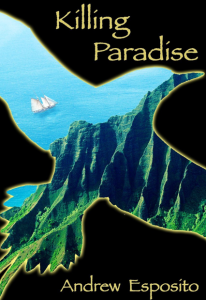
Underneath the basic events are deeper questions of the benefits and potential harms of collecting. This adds texture and depth to the book. The personalities of the characters, however, are what make this book work. Esposito does an excellent job of fleshing out his characters and providing a background for the web of loyalties and betrayals of these men and women (yes, women do play a important role in this story, and the women are as carefully portrayed as the somewhat larger-than-life men they share the stage with). Perhaps the most fascinating character in the book is neither a bird hunter nor a naturalist, but a ship captain with a colorful past and some dark secrets.
Though many of the characters are quite wicked, they are also complex and nuanced. Just when you think you’ve pegged someone as a mercenary and a jerk to boot, you see an aspect to his character you weren’t expecting. Esposito does not take the easy way out in working with his subjects.
The information—and there is quite a lot of it—about the natural history of the islands is worked smoothly into the story, so that you learn a great deal about the lifestyles, adaptations, and challenges to the birds without ever feeling as if you are reading a biology textbook. The story is just that, a story, never a tract or a lesson. There is also some interesting insight to the cultural differences between England and the islands. In the end, Killing Paradise is less about birds than the people who are passionate about them.
Esposito captures the flavor of the Victorian period in both the language and the attitudes of his characters. A discussion of Darwin’s then-new theory of evolution is both mildly amusing and very telling.
“Perhaps this extinction is the Lord’s will?” he said, pointing skywards. “Perhaps some creatures are not meant to survive through to Judgement Day?”
“It is a conundrum. I suspect many species of birds were lost from the islands before the arrival of Captain Cook,” he said, clasping his hands. “The particulars of these birds vanished with the forefathers of the Hawaiian people.”
Freeth scratched his beard. “Is it possible that you would kill the last bird of a species for the sake of science?”
Munro shrugged. “If a species cannot sustain itself, then it is doomed to failure anyway.”
“But what if it is not the fault of the species?”
“If one agrees with Darwin’s thoughts, then creatures have to adapt to changes in order to survive – or their species will be extinguished from our Earth.”
Freeth shook his head. “Is Mr Darwin saying that not everything the Lord has created is perfect? Perhaps this is the germ of a scandal?”
“It is a new theory,” he said, his face flustered. “All theories need their own evolution.”
“Not the Bible, George. The written word of The Lord has remained the same for two thousand years.”
Munro paused. “Perhaps it is an example of documenting evidence while it is still fresh?”
The book is smoothly written, well-edited and nicely formatted and has a lovely, professional looking cover. My only issue is that like so many books these days, this is only the first of a three-part series. This first installment was a beautifully told tale of greed, lust, and obsession alongside a sad and vanishing beauty. I just hope there is enough material here to keep the interest going for two more volumes.
Review Overview
Design
Content
Editing
Get an Editorial Review | Get Amazon Sales & Reviews | Get Edited | Get Beta Readers | Enter the SPR Book Awards | Other Marketing Services






















Leave A Comment